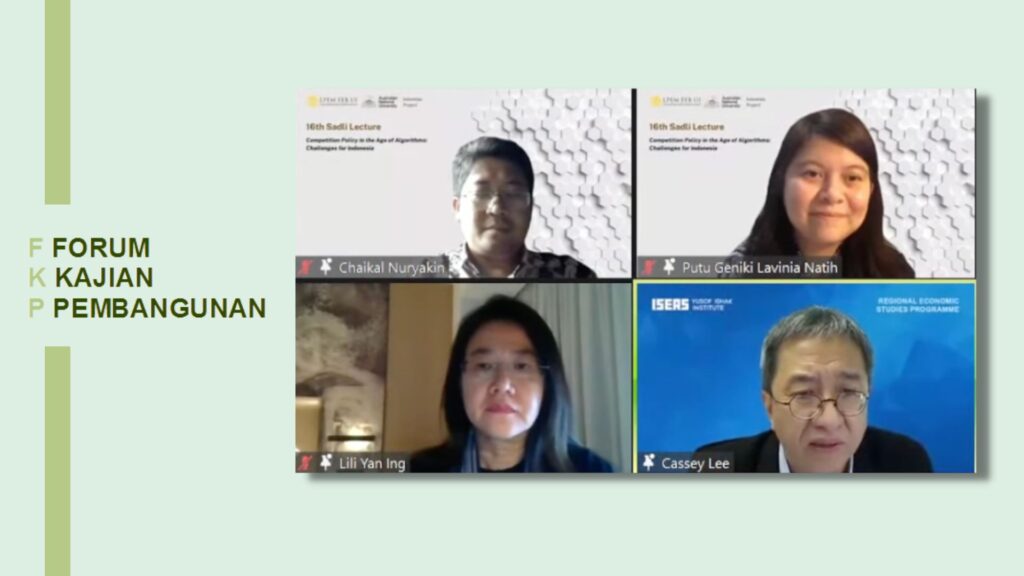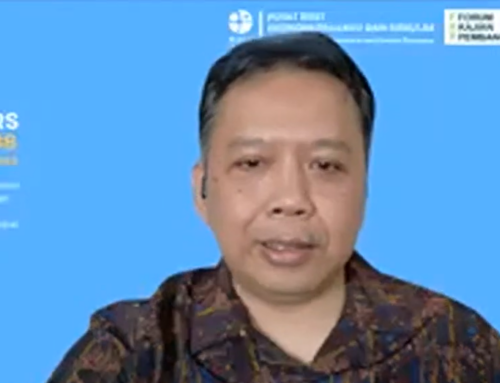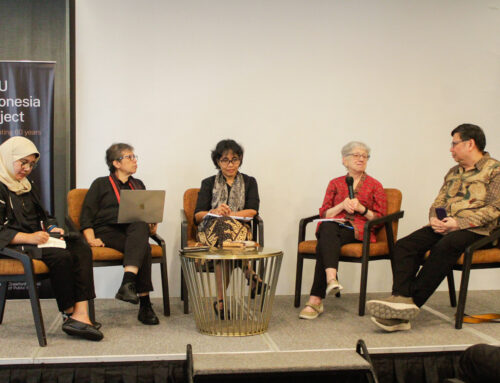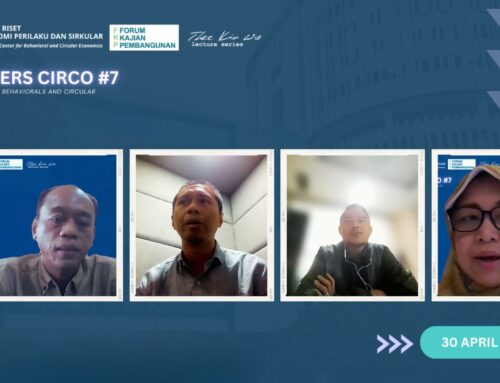The 16th annual Sadli Lecture was again held online this year, on Thursday, 19 Mei 2022. This special FKP event was hosted by LPEM FEB UI and ANU Indonesia Project. The speakers were Dr Chandra Setiawan (Indonesia Competition Commision/KPPU), Dr Cassey Lee (ISEAS-Yusof Ishak Institute), Dr Lili Yan Ing (Economic Research Institute for ASEAN and East Asia/ERIA), and Dr Chaikal Nuryakin (LPEM FEB UI)
Update December 2022. This lecture has now been published in the Bulletin of Indonesian Economist Studies (BIES) volume 58 issue 3. Download the paper from your library https://doi.org/10.1080/00074918.2022.2125488.
About 300 people attended the lecture on Zoom (231 attendees) and YouTube (66 views), where most were researchers and academics (58%), followed by government officials (21%), NGOs (9%) and the private sector (9%). More than half (56%) were males, and attendees were located mostly in Indonesia and Australia. Some attendees participated from other countries i.e., Singapore, Cambodia, Malaysia, Philippines, Germany, France, UK, USA and others. Professor Saparinah Sadli, wife of the late Professor Mohammad Sadli, joined the webinar briefly to thank everyone for remembering Mohammad Sadli. Mr Denny Admiral, Professor’s Sadli’s nephew, also attended the seminar.
KEY POINTS:
- New business models in digital markets have created regulatory uncertainty and challenges to competition authorities all over the world, including Indonesia. New digital inputs mean new competition policy challenges and there is an urgent need to contextualize competition policy in terms of the evolution of digital technologies. Algorithmic pricing makes it difficult for competition agencies to detect anti-competition practices using conventional means. There are regulatory concerns about collusion between autonomous pricing robots that are able to collude tacitly without any “intentions”.
- Algorithmic pricing has a significant impact on competition, therefore Indonesia needs to establish a research unit or conduct of research based on computers aimed at identifying these anticompetitive business practices. New capabilities are needed for KPPU, such as multidisciplinary skills and infrastructure on economics, law, and computer science. New approaches and tools are also needed, such as automated statistical analysis or data mining for collusion screening.
SUMMARY
- Chandra Setiawan from the Indonesian Competition Commission (Komisi Pengawas Persaingan Usaha/KPPU) discussed competition policy approaches in the digital market in Indonesia, where the internet economy will likely reach $330 billion in value by 2030 according to a study by Google and Temasek/Bain in 2021. New business models in digital markets have created regulatory uncertainty and challenges to competition authorities. There are two main enforcement challenges from algorithms and artificial intelligence-driven markets. The first challenge is related to tacit collusion. Under the scenarios of conscious parallelism and artificial intelligence, it is difficult to establish an agreement per se. The second challenge is related to artificial intelligence (AI). The enforcement could be even more challenging in the case of AI, as there is complete isolation of the “human” element from algorithms making strategic decisions. Governments must adopt a more multifaceted and nuanced approach to regulation. Competition authorities also need to ensure that we have adequate tools and skills to address the problems of an algorithm-driven economy.
- The 16th Sadli Lecture was delivered by Cassey Lee (ISEAS-Yusof Ishak Institute) on the topic of competition policy in the age of algorithms. Dr Lee prefaced his presentation by illustrating ways in which digital technologies and digital inputs present new competition policy challenges. Therefore, it is urgent need to contextualize competition policy in terms of the evolution of digital technologies. One of them is by understanding the impact of the use of algorithmic pricing on market competition. Algorithmic pricing makes it difficult for competition agencies to detect anti-competition practices using conventional means. There are regulatory concerns about collusion between autonomous pricing robots that can collude tacitly without any “intentions”. Regulators need to better understand the different types of learning mechanisms and their consequences for tacit collusion. Collusion screening in online markets can be more complicated due to its multi-product nature. One way to study this is to look at market shocks and how the price responds among sellers, to see whether the prices of sellers are correlated and whether pricing algorithms are used by sellers. However, multiproduct price dynamics are difficult to assess.
- Indonesia has the largest digital economy in SEA and a vibrant tech startup sector with major unicorns. It also has one of the oldest and most active competition agencies in SEA, KPPU established in 1998. Given that algorithmic pricing has a significant impact on competition, Indonesia needs to establish a research unit or conduct research based on computers aimed at identifying these anticompetitive business practices. New capabilities are needed for KPPU, such as multidisciplinary skills and infrastructure in economics, law, and computer science. New approaches and tools are also needed, such as automated statistical analysis or data mining for collusion screening. Access to big data is an important, more detailed official specification on what is required but still consistent with personal data protection laws.
- Algorithmic pricing is the result of autonomous pricing done by “robots”, not humans. The competition is higher in the digital era since consumers are just one click away from comparing prices and products. However, algorithms could still facilitate explicit collusion behavior, and be used in setting and monitoring prices – prices which were agreed upon between competitors. Chaikal Nuryakin (LPEM FEB UI) argued that price discrimination, rather than price collusion, might be more prevalent in the digital economy. The market concentration within e-commerce is probably mimicking the conventional market, only now more visualized since consumers’ decision to buy is driven also by the information revealed to or searched by the consumers themselves, in addition to the merchant profile such as consumer ratings and reviews of their products and/or services. Concern about non-competitive behavior on digital platforms/markets might need to be focused on the platform fee, preferential fee, and preferential access to other services such as financial technology and shipping services. One of KPPU’s roles could be to monitor these aspects.
- Digital transformation (e.gIndustrial Robots, Automation, and Artificial Intelligence) is one of the most crucial edges that change modern human life. While digital transformation improves productivity and trade, it also raises inequality, argues Lili Yan Ing (Economic Research Institute for ASEAN and East Asia/ERIA). There are consequences on employment and wages from digital transformation, particularly for less-skilled workers. Premature deindustrialization is also a common impact experienced by developing countries. G20 can be an effective forum to manage global digital transformation and digital trade. The G20 agenda should focus on improving the quality of key digital enablers for the adoption of industrial robots, automation, and AI. Efforts to improve preparedness for digital and AI technologies, including promoting incentives for ‘good technology’ adoption for developing countries should continue to be promoted. The quality of privacy law and competition/antitrust law, and their implementation worldwide also need to be improved.






